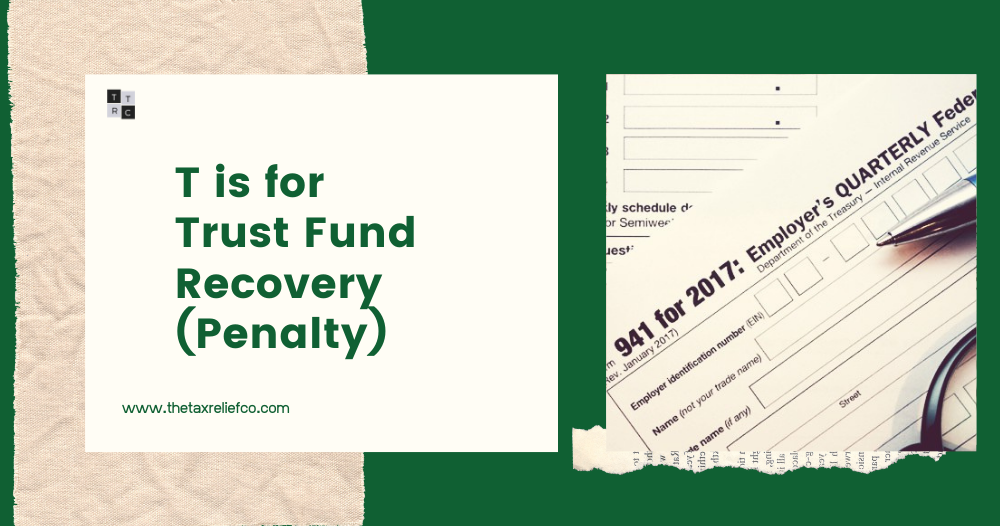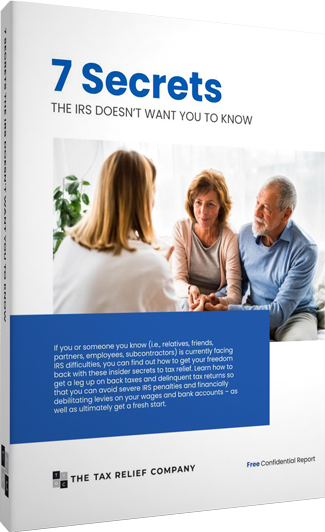T is For Trust Fund Recovery (Penalty)
T is For Trust Fund Recovery (Penalty)
Who is ultimately responsible for paying the IRS?
As a business owner, when you have salaried employees and withhold their Medicare, social security, and withholding tax, you are obligated by law to send that money to the IRS. These are called trust fund taxes.
If you neglect to make the payments, the IRS can charge a severe penalty called the Trust Fund Recovery Penalty (TFRP). It is no small matter so. You must act immediately. Some solutions can help get your business out of this challenging tax matter. Having an Enrolled Agent and Certified Tax Resolution Specialist experienced in handling these matters to resolve your problem is your best shot at getting a favorable outcome.
What is a trust fund recovery penalty?
The Trust Fund Recovery Penalty is the penalty you face if you withhold taxes from an employee and do not pay it to the IRS. It is one of the most substantial penalties charged by the IRS. Therefore, the IRS treats this very seriously. The penalty amount is equal to the unpaid balance of the trust fund tax. The penalty is computed based on the unpaid income taxes withheld and the employee’s portion of the withheld FICA taxes.
You are held responsible for delinquent payments as a business owner or corporate officer. The IRS will not hesitate to take your personal assets to collect their money.
- These taxes, Social Security, Medicare, and Federal Income taxes collected by the employer from employees are held “in trust” until due and payable.
- When a business doesn’t pay the IRS its employment taxes, the IRS will aggressively attempt to collect these taxes using tax liens and levies against the business’s bank accounts, investments, and property.
Who is responsible for paying the IRS?
Usually, a Revenue Officer will assess a TFRP against businesses that cannot or will not pay the assessment, “Civil Penalty,” or individuals involved in the company who has control over the use and disposition of the business’s assets. These individuals are often the decision-makers and have the authority to determine the payment of the business’s taxes. This can be seen as “willfully” failing to pay the business’s withholding taxes.
- These taxes belong to the U.S. government, not the business, and have been held in trust by the company. Therefore, the IRS has the full legal authority to assess and collect.
- Before a TFRP can be assessed, the IRS Revenue Officer’s examination of the company is conducted. First, he determines who was “willful and responsible” for the unpaid taxes. For example, this could include an individual’s check signing authority, the position held within the business, the percentage of ownership, who signed the tax returns, and who hired or fired employees.
- Once the Revenue officer has a clearer idea of who might be responsible, they will be interviewed and questioned. The IRS has a form specifically used to determine “willfulness and responsibility” – Form 4180, “Report of Interview with Individual Relative to Trust Fund Recovery Penalty or Personal Liability for Excise Taxes.” But, again, never attempt to do this on your own It’s not as simple as it sounds.
- Others, such as a bookkeeper or assistants, can be held responsible if part of their job description involves payroll.
We recommend you never try resolving this on your own. It is not as simple as it sounds.
Is there a time limit for the IRS to assess the trust fund recovery penalty?
- There is a statute of limitations of three years for assessing the TFRP
It may be possible to appeal against the assessment if an individual has a legitimate defense and can prove that they were either not willful in their non-payment or were not the individual responsible for paying the employment taxes. The IRS, via the “4180”, will try to get as many people as possible to be deemed willful and responsible.
How to remedy the problem?
- Protect yourself and your business; act immediately.
- If you are ready to begin your resolution process, speak with an Enrolled Agent (EA) and Certified Tax Resolution Expert (CTRS) at The Tax Relief Company today about your Trust Fund Recovery Penalty situation.
- Dealing with any tax issue should be priority #1. Now is the time to resolve your tax problem and do what you do best-run your business.
Jeffrey Schneider, EA, CTRS, ACT-E, has over 40 years of experience assisting taxpayers that find themselves with tax complications. However, if you owe more than 10K, contact us today to set up a free strategy session to assess your tax situation. We can then determine how we can help you eliminate your tax nightmare.
Contact us today by calling 877-355-8010 or book an appointment online.
#trustfundrecoverypenalty #tfrp #businessowner #company #enrolledagent #ctrs #ea #jeffreyschneiderea #thetaxreliefco



